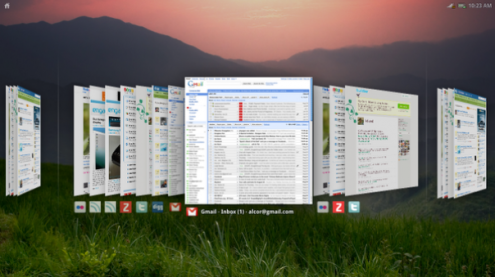
Courtesy Warner Bros.
Yesterday at my kids’ soccer tryouts, I overheard two young mothers discussing husband careers. Apparently one of them is starting a company that’s “building a rock climbing app in the metaverse.”
I smiled at the naivete. The metaverse isn’t real. It’s entertaining science fiction that recently became a buzzword to sell exaggerated internet developments.
It’s the emperor’s new clothes all over again—a modern Second Life. Remember that old hype?
To be clear, I’m all for building new things—even “pipe dreams” like shipping east coast water to west coast droughts. But substantial things are honestly described and easily understood every time.
Otherwise you’re discussing something that isn’t real.

Credit: Business Week
I recently read Paul Ford’s special report on software—all 36,000 words and three hours of it. If you work in computers, you should read it. If you work in business, you should read it. If you’re an adult human, you will learn a lot about the way things are and where they’re headed by reading it.
Admittedly, the story could have benefitted from some additional editing. Ford, after all, veers a little off topic. But like Bill Bryson, Ford is a master at explaining why things matter—in this case, why coders matter, and how they will increasingly influence the future.
If that’s doesn’t convince you to read the article’s entirety, maybe my 10 favorite excerpts will: Continue reading…

Microsoft
After failing to reverse the declining fortunes of the fourth largest company in the world, outgoing Microsoft boss Steve Ballmer teared up this week in his exit interview with WSJ.
“Maybe I’m an emblem of an old era, and I have to move on,” he said. “As much as I love what I’m doing, the best way for Microsoft to enter a new era is with a new leader.”
That must be an incredibly difficult thing to admit. I respect that. To ease his pain, Ballmer gets $18 billion in retirement. Pity him.
 Hey, you there. Yeah, you. Let’s play chess. It’s my new favorite pastime. Here’s how we can play each other:
Hey, you there. Yeah, you. Let’s play chess. It’s my new favorite pastime. Here’s how we can play each other:
- Locals only: Ask me. I’ve got a nice wooden board we can play on with big pieces. OR…
- Download Chess Time for iOS or Android, then invite blizake to play (or add you user name in the comments)
Although I prefer playing in person, digital chess is better than no chess.
What a game.
Thanks to Josh Rhine for making this my favorite app.
Pay them.
[youtube]http://www.youtube.com/watch?v=p92QfWOw88I&feature=channel_video_title[/youtube]
A lot of good ideas here—dare I say more than OSX Lion. Would like to see how it behaves with a mouse and keyboard, however.

After five loyal years using Firefox as my browser of choice, I finally switched to Google Chrome. Here’s why
- It’s noticeably faster than Safari, Firefox, and IE.
- It doesn’t crash like Firefox.
- Plugins and add-ons are much more stable.
- It’s smarter (i.e. it won’t overwrite a URL your inputing while loading a page) etc.
- It synchronizes my Internet experience, regardless of which machine I’m on.
- It has a minimized interface (doesn’t take up a lot of monitor space).
- It works with my Chromebook.
Admittedly, Firefox started the whole “smart browser” thing. But with Chrome, Google has built the better mousetrap. For now, at least.
[youtube]http://www.youtube.com/watch?v=vFeD3qGVsrM[/youtube]
I watched the Google Chrome OS demo today and came away impressed. The product won’t meet the need of power-users, producers, and mult-media creators. But for everyone else, including power-users when they don’t need extra power, Chrome OS is the first legitimate consumer rival for both Macintosh and Windows I’ve ever seen. Much more so than Linux ever was (at least in a consumer sense).
Some highlights about Chrome OS, which has a planned release of “mid-2011” in select Acer and Samsung laptops:
- “Nothing but the Web.”
- Chrome OS features a fast and simple setup process, remarkably fast boot times and an instant resume feature to minimize wait time when the OS wakes from sleep.
- Unified experience across Chrome on netbooks, desktops and more.
- Multiple user support and guest mode — everything a user does in guest mode is private and history is deleted instantly when a session is ended.
- Verizon Wireless cellular data connectivity (international options are available as well) in every Chrome OS notebook/netbook — no contracts, no activation fees and monthly plans starting at $9.99.
- Updates are seamless — no user operations are required to update the OS or apps.
- Most secure OS in the world — security is a major focus of Chrome OS; all Chrome OS data is encrypted by default.
- Verified boot — core OS components are in firmware that cannot be modified.
- Enterprise options — Google is working closely with partners like Citrix to ensure the enterprise market is addressed.
- Google’s Chrome OS PCs get faster over time, not slower like other PCs.
- Initial manufacturing partners include Acer, Samsung and Intel.
Will Chrome OS overtake the world? No. But I could see it becoming as ubiquitous as Google’s own Gmail, if not bigger. Which is huge.
In other words, watch this space. Desktop computing is about to change. If only in how we store an access many of our files.
See also: Will Google Chrome OS change computers?
Geeks only: Whenever you stumble upon the use of “Super Admin,” you can be sure of one thing: the software designer didn’t properly plan for multi-user access.
I saw this most recently today when considering the use of WordPress Network for an upcoming project. I’ve seen the term numerous times before, but always get a chuckle when seeing. In WordPress’ case, the creators originally designed the software to run only one website. When they decided to add functionality to manage multiple websites, they needed to add another administration layer on top. Hence the double use of admin.
Admittedly, I’ve designed short-sighted software before. But I’ve also done everything in my power to avoid using the age-old “super admin” naming convention. For WordPress, why not rename single-level administrators to “operator,” “manager,” or something less authoritative? If dead set on sticking with administrator, why not rename your top administrator to “master,” “commander,” “overlord” or something?
I realize “super admin” is universally understood by software geeks, myself included. But it sounds ridiculous, not to mention ad-hoc.

Go read my Fox & Friends story to find out.
 Mark Milian describes the best enhancement to iTunes one could ever hope for:
Mark Milian describes the best enhancement to iTunes one could ever hope for:
Music software has no way of knowing whether you like one song more than the previous, unless the user chooses to actively rate a track — thumb up in Pandora, 5-star picks in iTunes. Most people, I’d assume, don’t make the effort.
But you might find that many people, when they hear a song they like, will pump up the volume. Music services could listen to that, and take note for future instances of when it’s deciding what to play.
Do this, Apple. It would make iTunes loads smarter.

Like Click To Flash or Flash Block, Caffeine is a must for portable Mac users. With this tiny program installed, your monitor won’t dim unless you say so by clicking an icon on the menu bar. First discovered in December (thanks, Matt!), it’s just the shot my portable video needed to stay awake. There’s also a PC version.
I don’t despise Microsoft. I still use XP (alongside OS X on my Mac). Xbox 360 can be a fun time. And Word is still a must for professional document design (GoogleDocs is too limited in some cases). But in recent years, I’ve started to like Microsoft less and less. The reason? They follow the leader now instead of carving their own path. Says long-time tech columnist John C. Dvorak: “Microsoft is a software company. It has been distracted too easily by the success of others in essentially unrelated fields.”
Too support this claim, Dvorak convincingly mentions Microsoft’s ambitions to launch a Google-killer, iPod-killer, and Apple Store-killer… all at the same time! Previously the company tried to be an AOL-killer, Netscape-killer (that didn’t make any money), book-maker, toy-maker, and Photoshop-killer… all while Microsoft Office/Enterprise—the company’s bread and butter—brought in the real money. Frankly, I’m not sure Microsoft has pioneered an original idea in the last 15 years.

I want to completely transition to Mac next month, having preferred my PowerBook to my Windows desktop for three years now. Only problem: after hours (and I do mean hours) of research, I can’t seem to find a viable alternative to QuickBooks Online, which only runs on Internet Explorer 6 or higher, and therefore unavailable on Mac.
I’d prefer not to run Boot Camp to quickly invoice someone or receive payment. Any ideas, small business Mac users? You’re my only hope, as a lack of accounting software is the only thing holding me back from fully basking in the Macintosh waters. Thanks in advance.

Gmail launched in March 2004. But after more than four years, the site still uses “beta” on its logo.
For the uninitiated, “beta” is a fancy way of saying, “this software or website is a work in progress.” But all software and websites are works in progress, so the term is primarily used today to sound cool — nothing more.
So let’s drop that “beta,” Google. Besides, you’re not as cool as you once were (but I still love ya).
See also:
[youtube]http://www.youtube.com/watch?v=EHCRimwRGLs[/youtube]
IDG News (whom I freelance for) reports: “Microsoft’s brand power has been in sharp decline over the past four years, an indication the company is losing credibility and mindshare with U.S. business users, according to a recent study by market research firm CoreBrand.”
I enjoy seeing fat business cows get a proper market cleansing.
Continue reading…
Steve Krug argues in his book Don’t Make Me Think! that a good program or product should let users accomplish their intended tasks as easily and directly as possible. The less time it takes a person to complete a desired task (even if only by a few seconds), the more satisfying it becomes. When that happens, people are more likely to use a product in greater frequency and return for more. So in the spirit of improved usability, here are ten standard features every videogame designer should embrace.
Continue reading at Business Week…




 Hey, you there. Yeah, you. Let’s play chess. It’s my new favorite pastime. Here’s how we can play each other:
Hey, you there. Yeah, you. Let’s play chess. It’s my new favorite pastime. Here’s how we can play each other:

 Mark Milian
Mark Milian 

